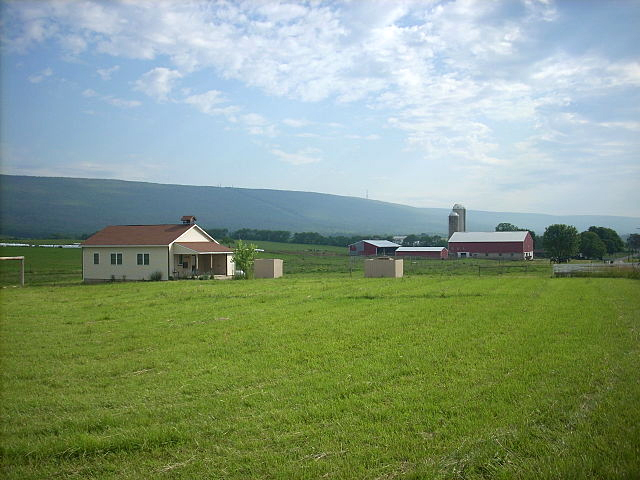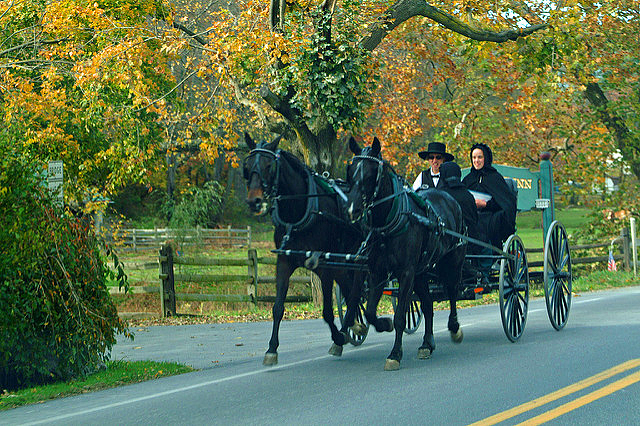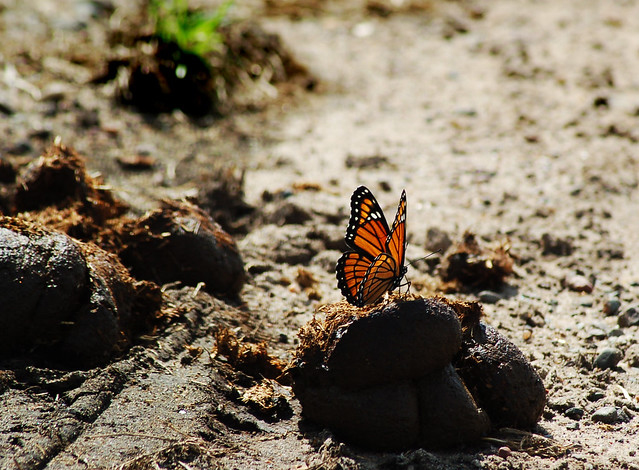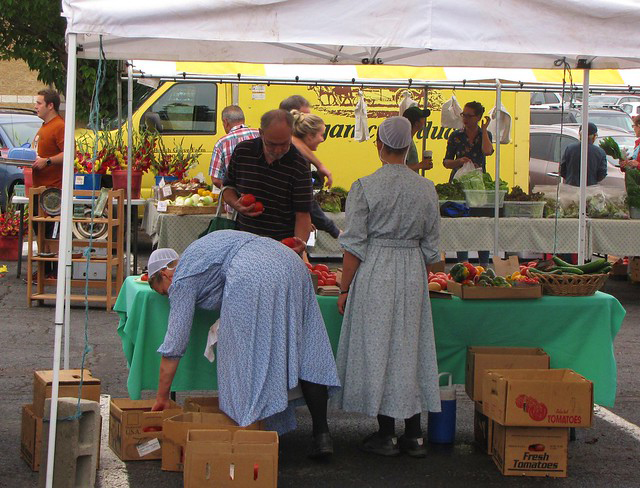Township supervisors in southern Lycoming County, Pennsylvania, heard a lot of opinions on Monday evening, August 5, about some proposed anti-Amish ordinances. Two different news accounts reported the substance of the ordinances, which seek to prevent the damage that the Amish horses allegedly cause to the roads and the even more common argument, that the horse manure on the roads is a disgusting health hazard.

The ordinances were open for public discussion at a Washington Township supervisors meeting in Elimsport, a village south of the city of Williamsport. According to one news story, a crowd of about 200 people attended the meeting held in the township fire hall, many of whom were Old Order Amish. One of the proposed ordinances would require the Amish horses to be shod with rubber horseshoes while the other required horses to be outfitted with manure collectors.
The other local news story about the meeting said that the three supervisors, Kenneth J. Bashista, George J. Ulrich and Ray LaForme, indicated that the township has a safety and health crisis to deal with that is caused by the Amish horses. The manure from the horses piles up on the highways and the metal horseshoes dig up the road surfaces.
The township Solicitor, Douglas N. Engelman, and an attorney hired by the Amish to represent them, Clifford A. Rieders, both spoke to the crowd. Solicitor Engelman said that the supervisors were not planning to vote on the proposed ordinances that evening—they wanted to give the opposing parties time to try and develop compromise solutions to the concerns expressed in the community. “I hope we can work it out with the Amish,” Engelman said.

Attorney Rieders responded for the Amish, many of whom are the children of Old Order parents who had migrated up from Lancaster County. “We’re happy to sit down and talk this out. There is enough hate in this world.” He argued that the proposed ordinances are anti-religious in nature—they violate Amish law. He added that the supervisors should not regulate the Amish way of life. “The law is on your side,” he told the Amish attendees after the public meeting.
Several “English” (non-Amish) people spoke up at the meeting. Ed Ulrich said that he resented walking around piles of horse manure on the road to reach his mailbox and Dick Secules expressed concern for the safely of motorcyclists when they ride through the manure. He said he had had to swerve into another lane to avoid a pile of manure, a life-threatening incident he’d confronted.

Secules also said that in his automotive garage in Elimsport, he feels threatened by the manure on tires that he has to inspect, align, or change. The manure is a health and safety concern, he said. Solicitor Engelman added that when vehicles with horse manure on their tires are driven into people’s garages, the manure can even get into their houses.
The Amish heard expressions of support from some non-Amish, however. Tina Lawer, responding to the complaints about the manure on the roads, suggested that people who are so bothered by it should buy a pooper scooper. Gary Jenkins was applauded for his comment about the Amish, “They are our neighbors. They have been wonderful to us in many ways.” Another person observed that when farmers move their manure spreaders along public roads from one field to another, they often drop manure too.
One resident reported that that he had just counted 16 piles of horse manure on his country road. One of the supervisors read a letter from another constituent who had counted 21 piles along the state highway, route 44, into Elimsport.
During the public meeting, Jacob Zook, an Amish farrier, told the supervisors that rubber horseshoes would disturb the gait of the horses. He suggested that the Amish could shoe their horses with a smoother steel that does not dig into the surfaces of the roads. Rubber horseshoes take the life out of the horse’s feet, he said, causing harm to their legs.

Attorney Rieders said that the proposed ordinances may be preempted by existing federal and state laws. He added that the ordinances are clearly discriminatory against the Amish, “who have turned rundown farms in Washington Township into beautifully manicured tracts.” He said they simply want to be left alone to live their traditional lives.
Engleman concluded the meeting by expressing hope that the supervisors can reach a compromise. He said that the supervisors needed to review the written and oral statements that had been presented and that they might want to change the proposed ordinances.

Attorney Rieders met with the Amish after the meeting and asked them how many had voted. Not a single hand was raised. When some of them asked him about involving state lawmakers, Rieders returned to the point that if their local representative in the state legislature, Garth Everett, knew that they were voters, their concerns would have a greater impact on him.
Several earlier news stories about the Amish have also focused on the public concern that their horses have a habit of dropping manure on public roads. It’s an issue that will not go away.